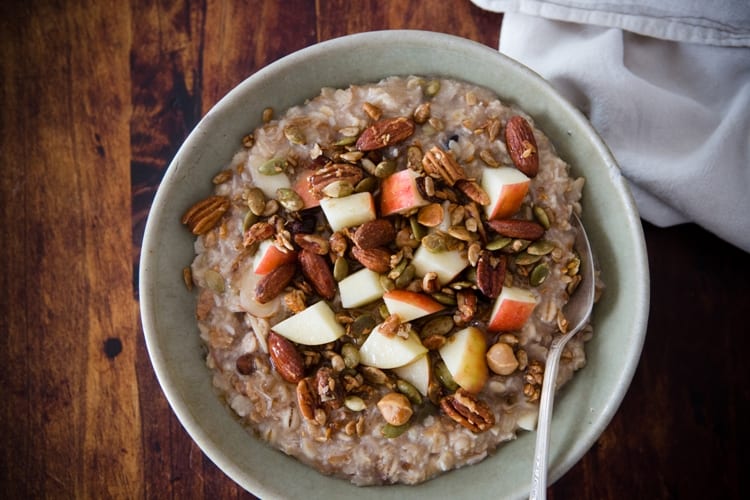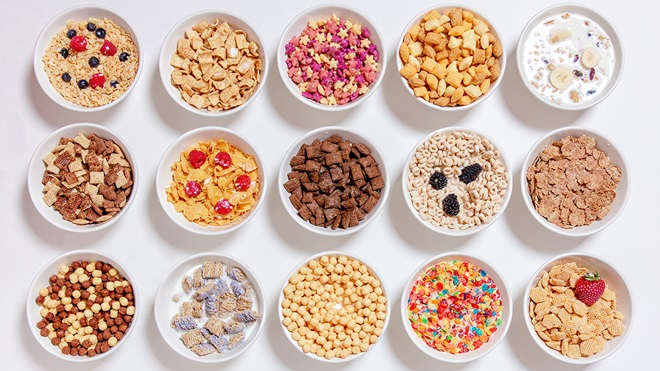Breakfast cereals are a popular morning staple, but a LOT of them are, how shall we say, in the bad-to-awful range health-wise.
If you walk down the cereal aisle of any grocery store, you’re bombarded by a colorful array of choices. And those are just the pre-packaged ‘boxed’ cereals.
Nutritionally, they are definitely not all equal. Many breakfast cereals, including the popular, heavily-marketed cereals, are highly processed and loaded with added sugars, refined grains, and artificial ingredients.
By contrast, the healthiest cereals will provide whole grains, fiber, protein, vitamins and minerals, without excessive additives.
So which cereals are actually the healthiest options to fuel your day? Let’s investigate…
What Makes a Healthy Cereal?
First, it’s important to define what constitutes a nutritious breakfast cereal. According to dieticians and our own registered nutritionist, these are the primary components to look for:
– Whole Grains: Whole grains, such as whole wheat, oats, brown rice, and quinoa provide complex carbohydrates, fiber, vitamins, minerals and even some protein. Refined grains strip away much of the nutritional value.
– Fiber: Aim for at least 3-5 grams of fiber per serving. Fiber promotes satiety, digestive health, stable blood sugar, and lower cholesterol.
– Protein: While not as high in protein as eggs or yogurt, some cereals provide 5 or more grams per serving from ingredients like whole grains, nuts, and seeds. Protein is important for muscle health and keeping you full.
– Limited Sugar: Many cereals, especially those marketed to kids, are very high in added sugars. Look for options with no more than 6-8 grams of added sugar per serving. Avoid artificial sweeteners as well.
– Vitamins and Minerals: Fortified cereals can be a good source of nutrients like iron, zinc, B vitamins, and vitamin D. However, eating a variety of whole foods is the best way to obtain essential micronutrients.
Top Contenders for Healthiest Cereal
With those criteria in mind, let’s look at some of the top contenders often recommended by dieticians and nutritionists – not necessarily in any order:
(Note: some of these are branded, but most have both branded and ‘generics’ available.)
- Oats: Yup, we’re referring to oats as in “oatmeal”, which is hard to beat when it comes to nutrition. Whether instant, rolled, or steel-cut, they provide filling fiber and have been shown to lower “bad” LDL cholesterol. Oats also contain unique antioxidants called avenanthramides that may reduce inflammation and blood pressure. Plain oats don’t have added sugar, and you can top them with fresh fruit for natural sweetness.
- Shredded Wheat: This simple cereal is made from just one ingredient – whole wheat. One serving provides about 6 grams of fiber and 5 grams of protein, with no added sugar or sodium. Shredded wheat has a satisfying crunch and nutty flavor. Opt for plain over frosted varieties, and sweeten with a little honey.
- Ezekiel 4:9 Sprouted Whole Grain Cereal: Made from sprouted whole grains and legumes, this unique cereal boasts 6 grams of protein and 5 grams of fiber per serving. Sprouting increases vitamin content and digestibility of grains. However, it is relatively high in sodium at 200mg per serving.
- Kashi 7 Whole Grain Puffs: These airy, crispy puffs are made from a blend of seven whole grains and sesame seeds. A serving provides 5g fiber, 4g protein, and just 1g sugar, while being low in sodium. It’s a great base for adding nuts, seeds, and fresh fruit.
- Cheerios: This classic cereal made from whole grain oats is a good source of fiber and quite low in sugar, with just 2 grams per serving. Cheerios also provide iron and several B vitamins. It’s a simple, affordable cereal option, although some may find it lacks flavor on its own.
Make Your Own Healthy Breakfast Cereal

Another option is to make your own nutritious cereal at home! You’ll have complete control over the ingredients. Some ideas:
– Oatmeal: There are so many ways you can spruce up ‘plain ole’ oatmeal, but I’ll leave this one to Erin Clarke’s highly regarded “Well Plated” blog: https://www.wellplated.com/oatmeal/
– Granola: Combine rolled oats, chopped nuts (almonds, walnuts, pecans), seeds (pumpkin, sunflower, chia), unsweetened dried fruit, and a dash of cinnamon. Toss with a little honey and coconut oil, spread on a baking sheet, and bake until golden.
– Granola: Similar to the above, the Mayo Clinic has an easy, excellent recipe for an apple, raisin, cinnamon granola cereal bar: https://www.mayoclinic.org/healthy-lifestyle/recipes/granola-with-raisins-apples-and-cinnamon/rcp-20049664
– Muesli Your Way: Originally, Muesli was a branded, cold Swiss breakfast dish, but has been co-opted by the breakfast foods industry. This unbaked cereal mix typically contains rolled oats, other whole grains like rye or barley flakes, dried fruit, nuts and seeds. Combine ingredients and store in an airtight container. Sweeten with some honey and enjoy with milk or yogurt.
– Quinoa Cereal: Cook quinoa in milk or water until creamy, then top with fresh fruit, nuts, seeds, and a drizzle of honey. Quinoa provides complete protein and makes a satisfying hot cereal.
Breakfast Bottom Line
With so many facets and options, the healthiest breakfast cereal will depend on your morning routine, and the degree to which you want to do as little as possible, or are willing to put some thought & effort into it.
Either way, prioritize breakfast cereals made with whole grains, that are higher in fiber and protein, and lower in added sugars and sodium. Oats, shredded wheat, sprouted grain cereals, and lightly sweetened whole grain puffs are all nutritious options.
You can also make your own whole grain cereal mixes like granola and muesli for a nourishing breakfast. A nutritious cereal, topped with fruits, nuts, seeds and milk or yogurt, can provide the fuel you need to start your day right.

